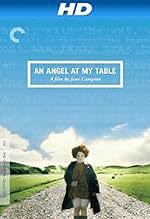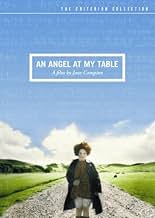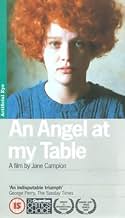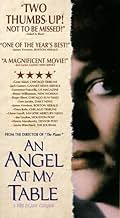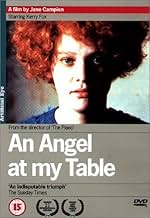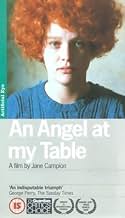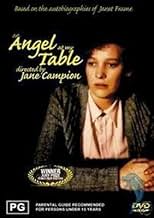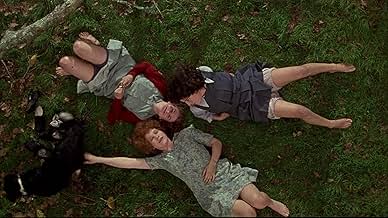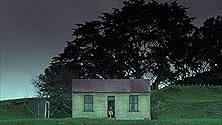IMDb रेटिंग
7.4/10
9.2 हज़ार
आपकी रेटिंग
जेनेट फ़्रेम एक होनहार बच्ची थी, जिसका किशोर अवस्था में, सिज़ोफ्रेनिया से ग्रसित होने का गलत रोगनिर्णय किया गया था. जेनेट की दुनिया की खोज और यूरोप में उसके जीवन के बारे में जाने, जब उसकी पु... सभी पढ़ेंजेनेट फ़्रेम एक होनहार बच्ची थी, जिसका किशोर अवस्था में, सिज़ोफ्रेनिया से ग्रसित होने का गलत रोगनिर्णय किया गया था. जेनेट की दुनिया की खोज और यूरोप में उसके जीवन के बारे में जाने, जब उसकी पुस्तकें सराही जाती हैं.जेनेट फ़्रेम एक होनहार बच्ची थी, जिसका किशोर अवस्था में, सिज़ोफ्रेनिया से ग्रसित होने का गलत रोगनिर्णय किया गया था. जेनेट की दुनिया की खोज और यूरोप में उसके जीवन के बारे में जाने, जब उसकी पुस्तकें सराही जाती हैं.
- पुरस्कार
- 19 जीत और कुल 5 नामांकन
Kevin J. Wilson
- Father
- (as K.J. Wilson)
फ़ीचर्ड समीक्षाएं
I discovered this incredible film by accident, if there are such things as accidents like this...I saw the title in a movie review book (and a very brief summary) and it intrigued me. Because I knew it was a New Zealand import from years ago, I never even bothered trying to locate a copy. So when it called out to me months later from the shelves in the video shop, I felt eerily compelled to rent it. I watched it by myself in the wee hours of the morning--and it could not have been more ideal.
An Angel at My Table is the story of New Zealand's famous writer, Janet Frame. Fairly long, but never boring, it is told in three 50 minute interludes, taking us through her impoverished childhood, awkward adolescence, and the terrifying and eventually triumphant years that follow: Janet was a plump little girl, with an unruly mop of bright red hair. She was fascinated with books and stories at an early age ~ a friend had lent her a copy of Grimm's which she treasured. A certificate of merit in grade school allowed her the use of the public library where she became even more immersed in literature. Despite financial hardships, her father managed to buy her a journal "for her writings." By her late teens she was no longer plump, but a rather crippling shyness had set in. At social functions she played the wallflower. She preferred to be by herself, where she could nurture her passion for creating stories. She went on to become a teacher (though the idea no longer appealed to her), and suffered a panic attack when a supervisor "sat in" on one of her classes. It was advised that Janet have a psychiatric evaluation--a misdiagnosis of schizophrenia (later changed to nothing more than shyness and depression) landed her in a mental institution for eight years of electric shock therapy, each session she narrated to be: "equal in fear to that of an execution." She was scheduled for a partial lobotomy when news reached her doctors that she had won a national literary award--during her hospitalization her sister had published a book of Janet's short stories. She was almost immediately released under the premise that a talented author couldn't possibly need the treatment she had been receiving....At this point Janet was in her late twenties, but her lengthy "exile" had given the impression that she was considerably younger than that. A friend of the family's, another writer who admired her work, offered her a cottage on his property so that she could write seriously in a distraction-free environment. She accepted the offer and her first completed work there was accepted soon after. European travels were arranged for her, more successful books were born, and fame attained...
I've heard it claimed that Janet had also attained happiness, but I am not sure that I agree. Janet had found numerous freedoms, emotional and financial and of course physical, but happiness? I believe that she had become comfortable with herself, and perhaps that in itself is a happiness. She never did fit into the surrounding world--but lived peacefully alone on the vaporous outskirts. A very supportive therapist in London had told her, "If people tell you that you should go out there and mix, and you don't feel like it,...don't." She took his words to heart.
I was surprised with the overall beauty of this film~I guess I should not have been~the director was Jane Campion (The Piano, Portrait of a Lady). The New Zealand landscapes and backstreets of Spain were gorgeously rendered, the accompanying score at times both capricious and melancholy. But above all, what struck me most, was how I identified with Janet. The plump and impoverished childhood, the obsession with writing, the painful shyness and reclusiveness. The life of the outsider~luckily minus the stay in the psychiatric ward. On some level I was Janet (or am Janet). And there is something oddly redemptive in finding a twin on screen or in a book, however juvenile the notion...
An Angel at My Table is the story of New Zealand's famous writer, Janet Frame. Fairly long, but never boring, it is told in three 50 minute interludes, taking us through her impoverished childhood, awkward adolescence, and the terrifying and eventually triumphant years that follow: Janet was a plump little girl, with an unruly mop of bright red hair. She was fascinated with books and stories at an early age ~ a friend had lent her a copy of Grimm's which she treasured. A certificate of merit in grade school allowed her the use of the public library where she became even more immersed in literature. Despite financial hardships, her father managed to buy her a journal "for her writings." By her late teens she was no longer plump, but a rather crippling shyness had set in. At social functions she played the wallflower. She preferred to be by herself, where she could nurture her passion for creating stories. She went on to become a teacher (though the idea no longer appealed to her), and suffered a panic attack when a supervisor "sat in" on one of her classes. It was advised that Janet have a psychiatric evaluation--a misdiagnosis of schizophrenia (later changed to nothing more than shyness and depression) landed her in a mental institution for eight years of electric shock therapy, each session she narrated to be: "equal in fear to that of an execution." She was scheduled for a partial lobotomy when news reached her doctors that she had won a national literary award--during her hospitalization her sister had published a book of Janet's short stories. She was almost immediately released under the premise that a talented author couldn't possibly need the treatment she had been receiving....At this point Janet was in her late twenties, but her lengthy "exile" had given the impression that she was considerably younger than that. A friend of the family's, another writer who admired her work, offered her a cottage on his property so that she could write seriously in a distraction-free environment. She accepted the offer and her first completed work there was accepted soon after. European travels were arranged for her, more successful books were born, and fame attained...
I've heard it claimed that Janet had also attained happiness, but I am not sure that I agree. Janet had found numerous freedoms, emotional and financial and of course physical, but happiness? I believe that she had become comfortable with herself, and perhaps that in itself is a happiness. She never did fit into the surrounding world--but lived peacefully alone on the vaporous outskirts. A very supportive therapist in London had told her, "If people tell you that you should go out there and mix, and you don't feel like it,...don't." She took his words to heart.
I was surprised with the overall beauty of this film~I guess I should not have been~the director was Jane Campion (The Piano, Portrait of a Lady). The New Zealand landscapes and backstreets of Spain were gorgeously rendered, the accompanying score at times both capricious and melancholy. But above all, what struck me most, was how I identified with Janet. The plump and impoverished childhood, the obsession with writing, the painful shyness and reclusiveness. The life of the outsider~luckily minus the stay in the psychiatric ward. On some level I was Janet (or am Janet). And there is something oddly redemptive in finding a twin on screen or in a book, however juvenile the notion...
In the ambitious follow-up to her celebrated debut feature 'Sweetie' Jane Campion presents yet another social misfit at odds with an unsympathetic world, drawing her inspiration this time from the autobiography of Janet Frame, a New Zealand writer who suffered eight years of electro-shock therapy after being misdiagnosed for schizophrenia. The film is structured in the form of a triptych, with the best moments (perhaps not surprisingly) all clustered in the first episode, showing the young Frame's childhood in a poor but literate household, always at the mercy of adult authority: teachers, doctors, and so forth. These early scenes aren't exactly meant to set a cheerful mood, but they look positively giddy compared to the rest of the film, the length of which eventually overwhelms its subject: watching the drab and lonely life of a painfully shy, pathetically insecure, repressed and introverted writer unfold over 158 minutes can be an oppressive experience. Campion's unique visual style is never less than interesting, but her technique of using sudden blackouts to separate short, seemingly unrelated fragments of narrative memory only underscores the difficulty of capturing on film the creative process of a writer.
I think this film is another fine example of Kiwi talent! Some incredibly original literature, film, television, and acting talent originates from the island nation of New Zealand. "An Angel At My Table" is one of the great examples. The first time I saw this film (or tele-film) I was left emotionally affected by Janet Frame's life. I could not believe how easy it was for someone to be treated the way she was just because she was shy, socially awkward and had curly, red hair. How times have changed! Nowadays if you are not a freak ... you are a freak! It is scary to think how easy it was, apparently at that time, for a person to be thrown into a madhouse. Not to mention the deplorable conditions of those types of institutions.
Initially, I felt sorry for Ms. Frame but then I realized she probably has had a fuller life than I have had (or probably ever will). She has accomplished so much and given pleasure to the many who have read her stories and poetry. Watching this film has prompted me to begin looking for her writings since I have been so intrigued by her story. I was glad to see that by the end of the movie she had begun to become comfortable with herself and open her shell. Biographical information on Ms. Frame seems sketchy. I have not found much information about her life after the period where the film ended.
Thank you Jane Campion for another wonderful character driven film (albeit a real-life character this time)! The only real criticism I have of the film is the portrayal of Frame's time in the institution. While the film did not make it pretty nor gloss over the situation in general, sources I have read indicate Janet was dangerously close to receiving an operation that seems similar to a lobotomy. The operation, if performed, would have left Janet an emotionless, child-like creature and was not adequately depicted. But for the grace of her publication, she was saved.
Initially, I felt sorry for Ms. Frame but then I realized she probably has had a fuller life than I have had (or probably ever will). She has accomplished so much and given pleasure to the many who have read her stories and poetry. Watching this film has prompted me to begin looking for her writings since I have been so intrigued by her story. I was glad to see that by the end of the movie she had begun to become comfortable with herself and open her shell. Biographical information on Ms. Frame seems sketchy. I have not found much information about her life after the period where the film ended.
Thank you Jane Campion for another wonderful character driven film (albeit a real-life character this time)! The only real criticism I have of the film is the portrayal of Frame's time in the institution. While the film did not make it pretty nor gloss over the situation in general, sources I have read indicate Janet was dangerously close to receiving an operation that seems similar to a lobotomy. The operation, if performed, would have left Janet an emotionless, child-like creature and was not adequately depicted. But for the grace of her publication, she was saved.
What do these people have in common: Lou Reed, Vivien Leigh, Yves Saint Laurent, and Janet Frame? Answer: They were all given electroconvulsive shock therapy for highly questionable reasons, and suffered because of it.
Going in to this film I'd never read anything by New Zealand author Janet Frame, but nevertheless found the story of her life to be interesting. She's a compelling figure because of how awkward she was, clearly intelligent and talented but also riddled with social anxiety. It's very well cast, with the transitions between three actresses at differing portions of her life from child to adult being seamless, and all giving good performances.
I didn't give the film a higher rating because despite coming in at 238 minutes spread out over three parts, it left me with questions about aspects of her life and somehow lacked detail in places it shouldn't have, and was probably too long in others. Transitions were often on the abrupt side, and there seemed to be a certain softening of things. Maybe that's how life is when told with a backward glance over decades though, I don't know. Anyway, it's a pretty good film, and one with an uplifting spirit to it.
Going in to this film I'd never read anything by New Zealand author Janet Frame, but nevertheless found the story of her life to be interesting. She's a compelling figure because of how awkward she was, clearly intelligent and talented but also riddled with social anxiety. It's very well cast, with the transitions between three actresses at differing portions of her life from child to adult being seamless, and all giving good performances.
I didn't give the film a higher rating because despite coming in at 238 minutes spread out over three parts, it left me with questions about aspects of her life and somehow lacked detail in places it shouldn't have, and was probably too long in others. Transitions were often on the abrupt side, and there seemed to be a certain softening of things. Maybe that's how life is when told with a backward glance over decades though, I don't know. Anyway, it's a pretty good film, and one with an uplifting spirit to it.
"An Angel at My Table" (New Zealand, 1990): It's been three years since I've last watched this film. There is NO further reason to wonder if it should be in my "top" category. It is created by Jane Campion from the writer Janet Frame's autobiographies of her harrowing life. We join Janet during childhood, move through the teenage years and into adulthood, as she struggles for a place - ANY place - in the world...but deep down, writing is her one reliable love. Three actresses were needed for the role of Janet, and all do wonderful jobs, especially depicting someone who always feels on the outside, and longs to be included. Jane Campion, one of my favorite film makers, presents a powerful, subdued, and melancholy work of Art. It is not an amazing film due to every camera shot or the quality of sound recording
THIS work is great for its acting, and its story telling. It has as much emotion as one heart can hold for 157 minutes.
क्या आपको पता है
- गूफ़The streets of Ibiza have some features that surely were not present on the 50s, i.e., a "no parking" signal on one of the streets. Cars were very rare on the island those days.
- साउंडट्रैकSomebody Stole My Gal
Written by Leo Wood
Performed by Pat McMinn with Crombie Murdoch and the Nickelodeons
Used by permission of D.F. Peach
टॉप पसंद
रेटिंग देने के लिए साइन-इन करें और वैयक्तिकृत सुझावों के लिए वॉचलिस्ट करें
- How long is An Angel at My Table?Alexa द्वारा संचालित
विवरण
- रिलीज़ की तारीख़
- कंट्री ऑफ़ ओरिजिन
- भाषाएं
- इस रूप में भी जाना जाता है
- Un ángel en mi mesa
- फ़िल्माने की जगहें
- उत्पादन कंपनियां
- IMDbPro पर और कंपनी क्रेडिट देखें
बॉक्स ऑफ़िस
- US और कनाडा में सकल
- $10,54,638
- US और कनाडा में पहले सप्ताह में कुल कमाई
- $12,905
- 27 मई 1991
- दुनिया भर में सकल
- $10,55,995
- चलने की अवधि2 घंटे 38 मिनट
- रंग
- पक्ष अनुपात
- 1.66 : 1
इस पेज में योगदान दें
किसी बदलाव का सुझाव दें या अनुपलब्ध कॉन्टेंट जोड़ें



